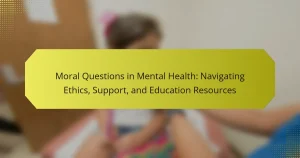Understanding moral development stages is essential for enhancing mental health and emotional well-being. This article explores the three levels of moral development, their impact on ethical reasoning, and how they shape empathy and relationships. It also discusses the role of cultural context and early experiences in moral growth. Finally, effective practices for supporting individuals through these stages are highlighted.
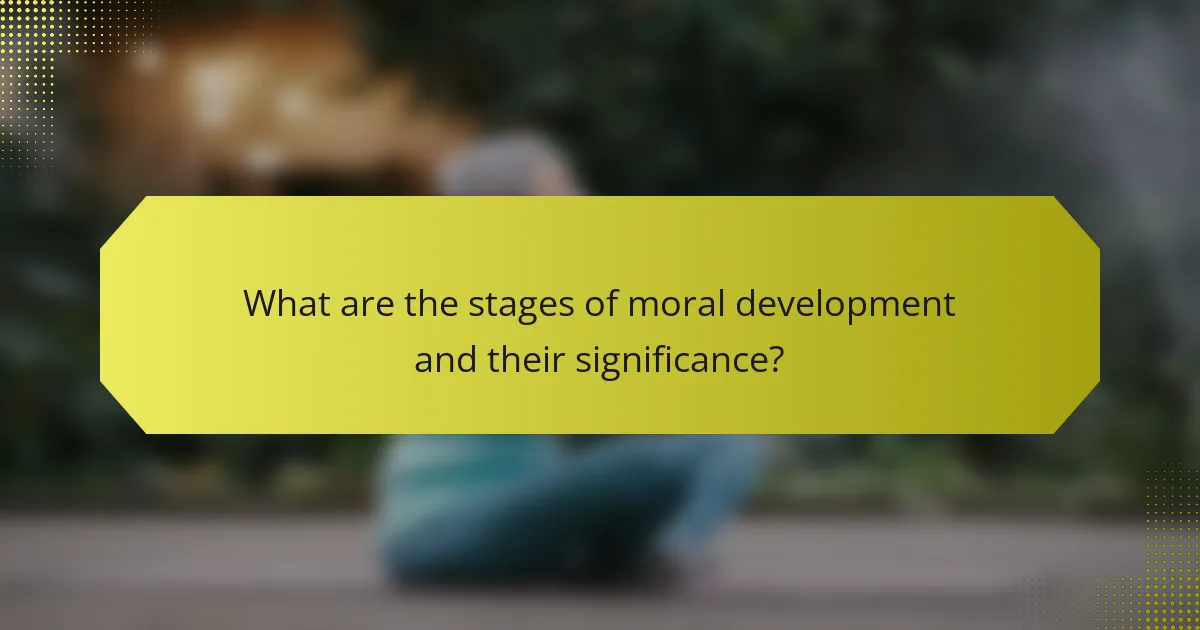
What are the stages of moral development and their significance?
Moral development consists of stages that significantly influence mental health and emotional well-being. Understanding these stages helps individuals navigate ethical dilemmas and fosters social harmony.
The stages of moral development, as proposed by Lawrence Kohlberg, include:
1. **Pre-conventional Level**: Focus on self-interest and obedience to avoid punishment.
2. **Conventional Level**: Emphasis on social norms and the desire for approval from others.
3. **Post-conventional Level**: Recognition of universal ethical principles and individual rights.
Each stage plays a crucial role in shaping an individual’s moral reasoning and decision-making processes. For example, progressing through these stages enhances empathy and promotes healthier relationships. As a result, individuals often experience improved emotional resilience and mental health outcomes.
How do moral development stages relate to mental health?
Moral development stages significantly influence mental health and emotional well-being. Understanding these stages helps identify how individuals process ethical dilemmas and social interactions, impacting their psychological resilience.
Research indicates that advanced moral reasoning correlates with better emotional regulation. Individuals at higher stages of moral development tend to exhibit greater empathy and social awareness, which can lead to healthier relationships and reduced anxiety. Conversely, those at lower stages may struggle with conflict resolution and emotional distress.
Additionally, moral conflicts can trigger mental health issues. When individuals face dilemmas that challenge their moral beliefs, it can lead to stress, guilt, or depression. Addressing these conflicts through therapy can promote healthier coping mechanisms and improved mental health outcomes.
In summary, the relationship between moral development stages and mental health is complex. Higher stages typically foster emotional well-being, while lower stages can contribute to psychological challenges. Understanding this connection can guide interventions aimed at enhancing both moral reasoning and mental health.
What are the emotional well-being implications of each stage?
Each stage of moral development significantly influences emotional well-being. Early stages often foster a sense of security and belonging, while later stages promote autonomy and self-identity. For instance, during the conventional stage, individuals may experience increased anxiety due to societal expectations. As a result, understanding these stages can enhance mental health strategies tailored to individual emotional needs.
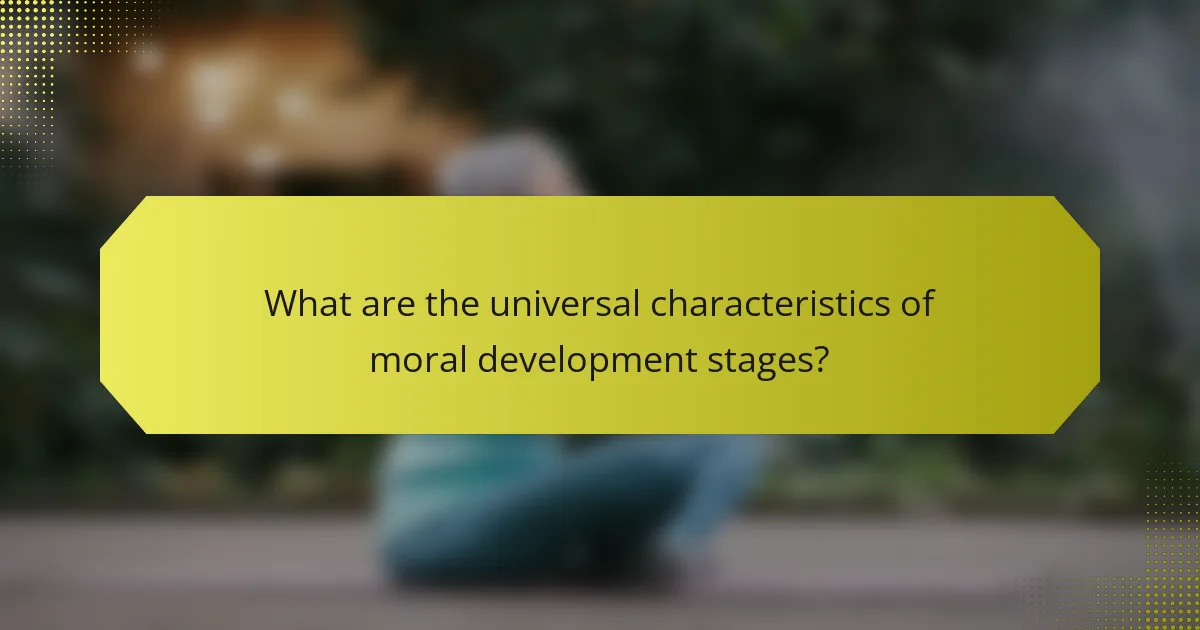
What are the universal characteristics of moral development stages?
Moral development stages share universal characteristics that influence mental health and emotional well-being. These stages reflect the progression of moral reasoning from simplistic to complex frameworks.
Key characteristics include the recognition of moral dilemmas, the development of empathy, and the understanding of justice and fairness. Each stage builds upon the previous one, indicating a unique attribute of moral growth.
The impact of these stages on mental health is significant, as individuals with advanced moral reasoning often exhibit greater emotional resilience. As a result, moral development can serve as a foundation for positive mental health outcomes.
Understanding these universal characteristics helps in fostering environments that support moral reasoning, ultimately enhancing emotional well-being.
How do these characteristics manifest across different age groups?
Moral development characteristics manifest differently across age groups, influencing mental health and emotional well-being. Young children often exhibit egocentric moral reasoning, focusing on consequences rather than intentions. As they grow, adolescents develop a more nuanced understanding, balancing personal ethics with societal norms. Adults typically demonstrate complex moral reasoning, integrating empathy and ethical principles. Older adults may reflect on their moral choices, leading to a deeper sense of purpose and emotional resilience. This progression highlights the unique attributes of moral reasoning at each life stage, impacting overall psychological health.
What role do cultural factors play in moral development?
Cultural factors significantly influence moral development by shaping values, beliefs, and social norms. These elements affect how individuals perceive right and wrong, impacting mental health and emotional well-being. For instance, collectivist cultures may emphasize community and family obligations, leading to a unique moral framework. In contrast, individualistic cultures often prioritize personal autonomy and self-expression. This divergence can result in varied emotional responses and coping mechanisms, highlighting the importance of cultural context in moral reasoning. Understanding these influences can enhance approaches to mental health support, making them more culturally sensitive and effective.
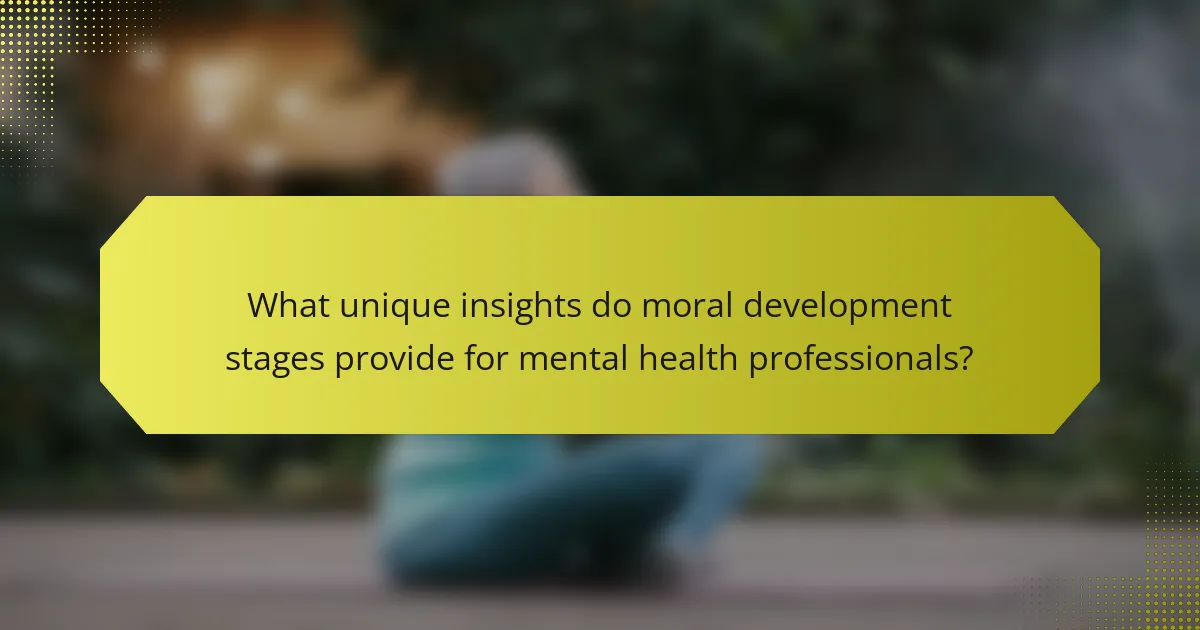
What unique insights do moral development stages provide for mental health professionals?
Moral development stages offer valuable insights for mental health professionals by highlighting how individuals process ethical dilemmas. Understanding these stages enables professionals to tailor interventions that align with a client’s moral reasoning, enhancing therapeutic effectiveness. For example, recognizing a client’s developmental stage can inform strategies to address conflicts between personal values and societal expectations, ultimately fostering emotional well-being. Additionally, integrating moral development insights can improve communication and trust in the therapeutic relationship, as clients feel understood within their moral framework.
How can understanding these stages enhance therapeutic practices?
Understanding the stages of moral development enhances therapeutic practices by providing insights into clients’ ethical reasoning and emotional responses. Therapists can tailor interventions based on the client’s developmental stage, fostering empathy and moral reasoning. This approach can improve emotional well-being by addressing the unique challenges individuals face at different stages. For instance, clients in earlier stages may struggle with authority, while those in advanced stages might grapple with complex moral dilemmas. By recognizing these nuances, therapists can create more effective, personalized treatment plans that support mental health growth.
What specific interventions can be derived from moral development theories?
Moral development theories inform interventions that enhance mental health and emotional well-being. These interventions include educational programs that promote empathy, conflict resolution strategies, and community service initiatives.
Educational programs, such as those based on Kohlberg’s stages, help individuals understand moral reasoning and ethical decision-making. Conflict resolution strategies teach individuals to navigate disagreements effectively, fostering emotional intelligence. Community service initiatives encourage altruism and social responsibility, reinforcing moral values.
These interventions can lead to improved emotional resilience and stronger social connections, which are critical for mental health. Research indicates that individuals engaged in community service report higher levels of life satisfaction and lower levels of depression.
Incorporating moral development principles into therapy can also provide unique insights into clients’ values and motivations, enhancing therapeutic outcomes.
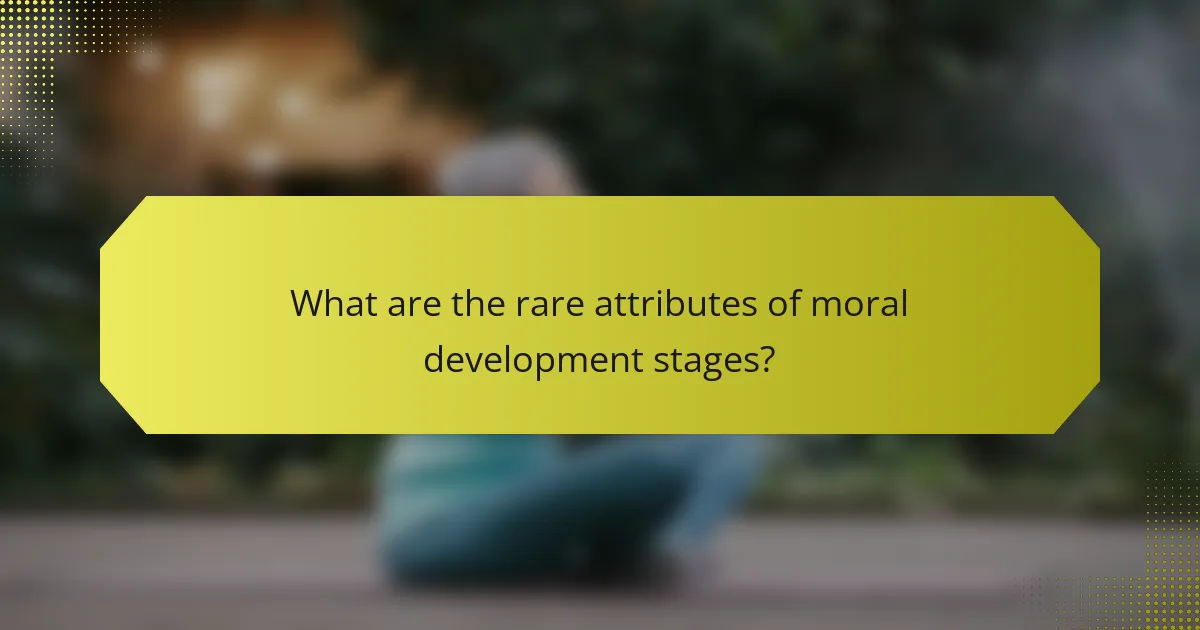
What are the rare attributes of moral development stages?
The rare attributes of moral development stages include the influence of cultural context, the impact of early childhood experiences, and the role of cognitive dissonance. These attributes shape how individuals navigate moral dilemmas and develop their ethical frameworks, ultimately affecting their mental health and emotional well-being. Understanding these unique attributes can provide deeper insights into the complexity of moral reasoning and its implications.
How do atypical moral development paths affect mental health?
Atypical moral development paths can significantly affect mental health by leading to emotional dysregulation and social challenges. Individuals may struggle with empathy, resulting in isolation and anxiety. Unique moral development stages, such as delayed or distorted progression, can contribute to increased risk of depression. As a result, understanding these atypical paths is crucial for effective mental health interventions.
What are the implications of moral development disruptions?
Disruptions in moral development can lead to significant mental health and emotional well-being issues. These disruptions may result in impaired decision-making, difficulty in forming relationships, and increased susceptibility to anxiety and depression. Individuals may struggle with empathy and moral reasoning, which can hinder social interactions and personal growth. Long-term implications include persistent behavioral issues and challenges in adapting to societal norms. Addressing these disruptions early can promote healthier emotional outcomes and improved mental health.
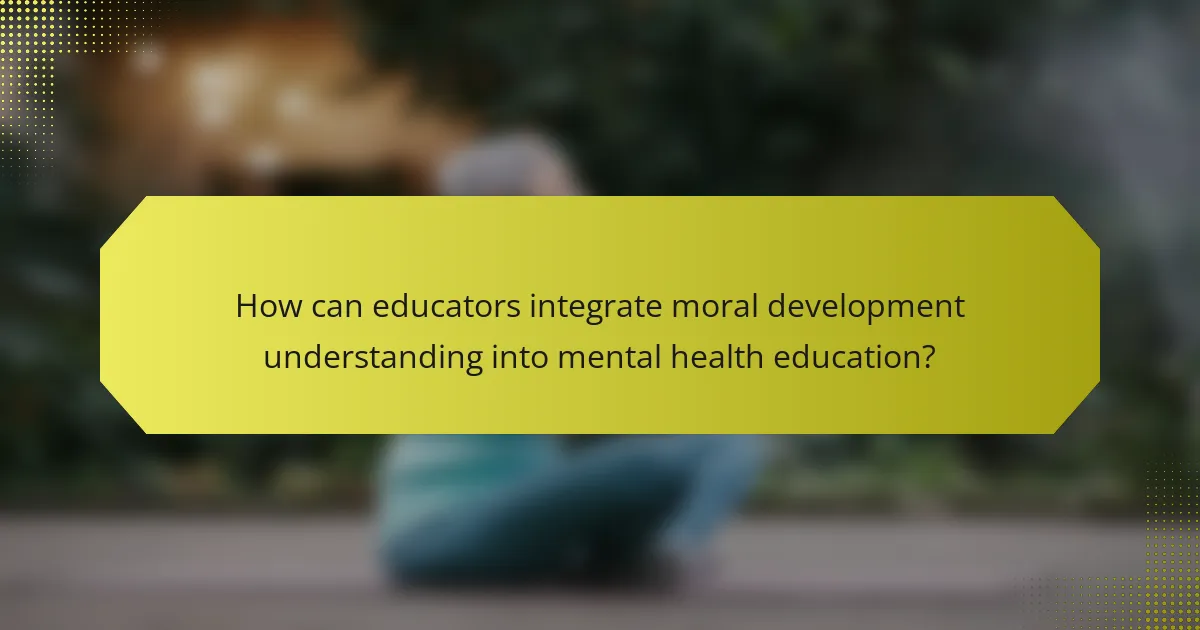
How can educators integrate moral development understanding into mental health education?
Educators can effectively integrate moral development understanding into mental health education by incorporating relevant theories and practices. This approach enhances students’ emotional well-being and decision-making skills.
One effective method is to use moral development stages as a framework. For example, educators can introduce discussions around Kohlberg’s stages of moral development, encouraging students to reflect on their values and ethical dilemmas. This reflection fosters a deeper understanding of personal and societal responsibilities, which is crucial for mental health.
Additionally, role-playing scenarios can be implemented to help students navigate moral challenges. This interactive approach allows students to practice empathy and conflict resolution, reinforcing their emotional intelligence.
Finally, integrating community service projects into the curriculum can provide students with real-world applications of moral reasoning. Engaging in service helps build a sense of purpose and connection, contributing positively to mental health outcomes.
What strategies can be employed in school settings?
To enhance moral development in school settings, employ strategies that foster empathy and ethical reasoning. Implementing programs that promote social-emotional learning can significantly improve students’ mental health and emotional well-being.
Encourage collaborative group activities that allow students to practice conflict resolution and perspective-taking. Integrate discussions on moral dilemmas into the curriculum, facilitating critical thinking about ethical issues.
Promote a positive school climate through consistent values and role modeling by educators. Recognize and reward acts of kindness and integrity to reinforce desired behaviors.
Finally, involve parents and the community in moral development initiatives, creating a supportive network that extends beyond the classroom.
How can parents support moral development at home?
Parents can support moral development at home by fostering open communication and modeling ethical behavior. Engaging children in discussions about right and wrong enhances their understanding of moral principles. Encouraging empathy through community service or storytelling builds emotional intelligence. Establishing consistent family values provides a framework for decision-making.
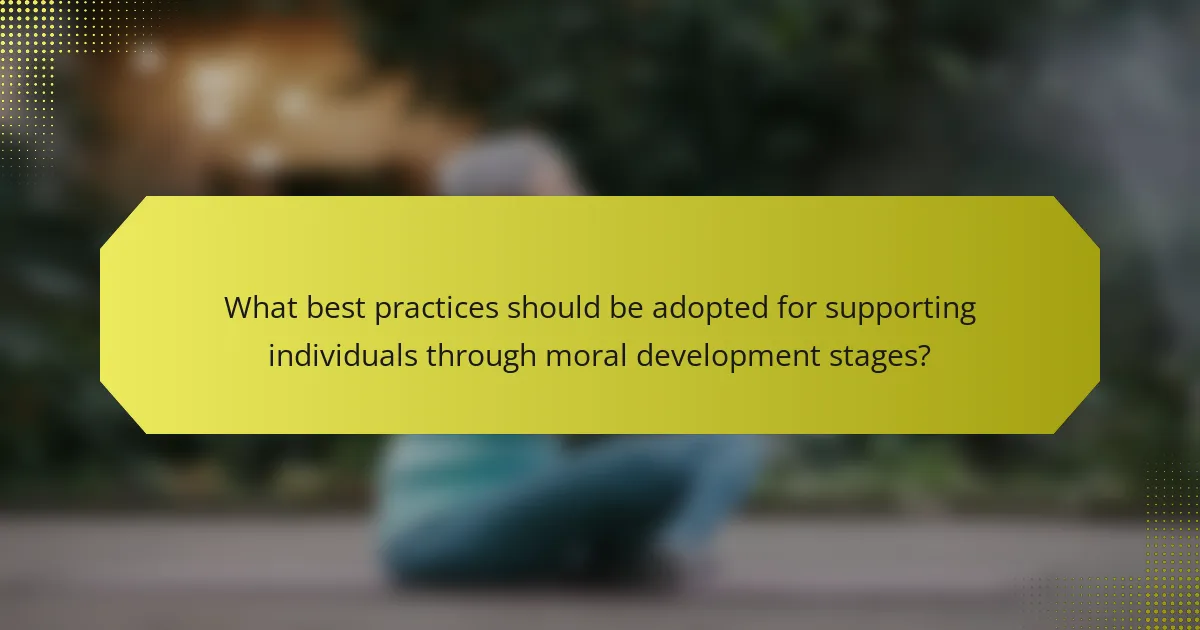
What best practices should be adopted for supporting individuals through moral development stages?
Supporting individuals through moral development stages involves fostering an environment that encourages ethical reasoning and emotional growth. Key practices include active listening, providing guidance without judgment, and promoting self-reflection.
1. Facilitate open discussions about moral dilemmas to enhance critical thinking.
2. Encourage empathetic understanding by sharing diverse perspectives.
3. Support decision-making processes by offering frameworks for evaluating choices.
4. Model ethical behavior as a reference point for individuals.
5. Create safe spaces for individuals to express their thoughts and feelings.
These practices enhance mental health and emotional well-being by reinforcing a sense of agency and moral clarity.
What common mistakes should be avoided in the process?
Avoiding common mistakes in moral development stages is crucial for enhancing mental health and emotional well-being. Key pitfalls include neglecting individual differences in moral reasoning, oversimplifying the stages, and failing to integrate emotional aspects. Understanding that moral development is not a linear process helps in recognizing the complexity of individual experiences. Additionally, overlooking the role of social context can hinder effective support for emotional growth. Recognizing these mistakes can lead to more effective strategies for fostering moral understanding and emotional resilience.
How can individuals optimize their moral reasoning for better mental health outcomes?
Individuals can optimize their moral reasoning by reflecting on their values and understanding moral development stages. Engaging in discussions about ethical dilemmas enhances critical thinking and emotional awareness.
Practicing empathy and considering diverse perspectives improves moral reasoning and emotional well-being. Research shows that higher moral reasoning correlates with better mental health outcomes, including reduced anxiety and depression.
Additionally, applying moral principles in everyday decisions fosters a sense of purpose and belonging, which are crucial for emotional resilience. Regular self-reflection on moral choices can lead to personal growth and improved mental health.

